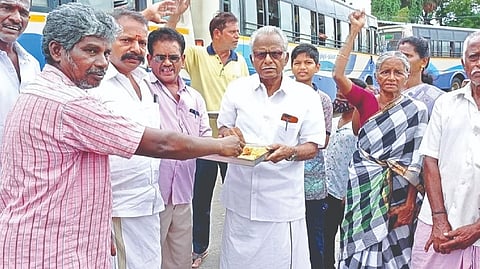

CHENNAI: The Supreme Court on Wednesday ordered the release of AG Perarivalan, who was in jail for over 30 years after being convicted in the assassination of former Prime Minister Rajiv Gandhi in 1991, invoking its extraordinary powers under Article 142 of the Constitution to do “complete justice” in a pending case.
Observing that the inexplicable delay in deciding remission is “inexcusable” as it contributes to adverse physical conditions and mental distress to the inmates, a bench headed by Justice L Nageswara Rao said the Tamil Nadu cabinet’s advice recommending the premature release of all the seven convicts in the Rajiv Gandhi assassination case was binding on the Governor.
Delivering its 29-page verdict that came three days ahead of Rajiv Gandhi’s 31st death anniversary, the apex court also rejected the Centre’s argument that the President exclusively has the power to grant pardon in a case under IPC Section 302(murder), saying this would render Article 161 (power of Governor to grant pardon) functionless. The bench, also comprising Justice BR Gavai, held that states have the power to advise and aid the Governor in the case of pleas of pardon under Article 161 made by convicts in murder cases. The Centre had earlier defended the Tamil Nadu Governor’s decision to send the mercy plea of Perarivalan to the President.
Article 142 of the Constitution deals with the Supreme Court’s power to exercise its jurisdiction and pass order for doing “complete justice” in any case or matter pending before it. The article was also used in the Ram Janmabhoomi-Babri Masjid land dispute case in which the apex court granted the ownership of the 2.77 acres of disputed land in Ayodhya to a trust, paving the way for the construction of a Ram Temple. On March 9, the top court had granted bail to Perarivalan while taking note of his long incarceration and no history of complaints when out on parole.
The court has been hearing pleas including the one in which Perarivalan sought suspension of his life sentence in the case till the Multi Disciplinary Monitoring Agency (MDMA) probe is completed. “The advice of the State Cabinet is binding on the Governor in matters relating to commutation/remission of sentences under Article 161. No provision under the Constitution has been pointed out to us nor any satisfactory response tendered as to the source of the Governor’s power to refer a recommendation made by the State Cabinet to the President of India,” the apex court said.
Visit news.dtnext.in to explore our interactive epaper!
Download the DT Next app for more exciting features!
Click here for iOS
Click here for Android